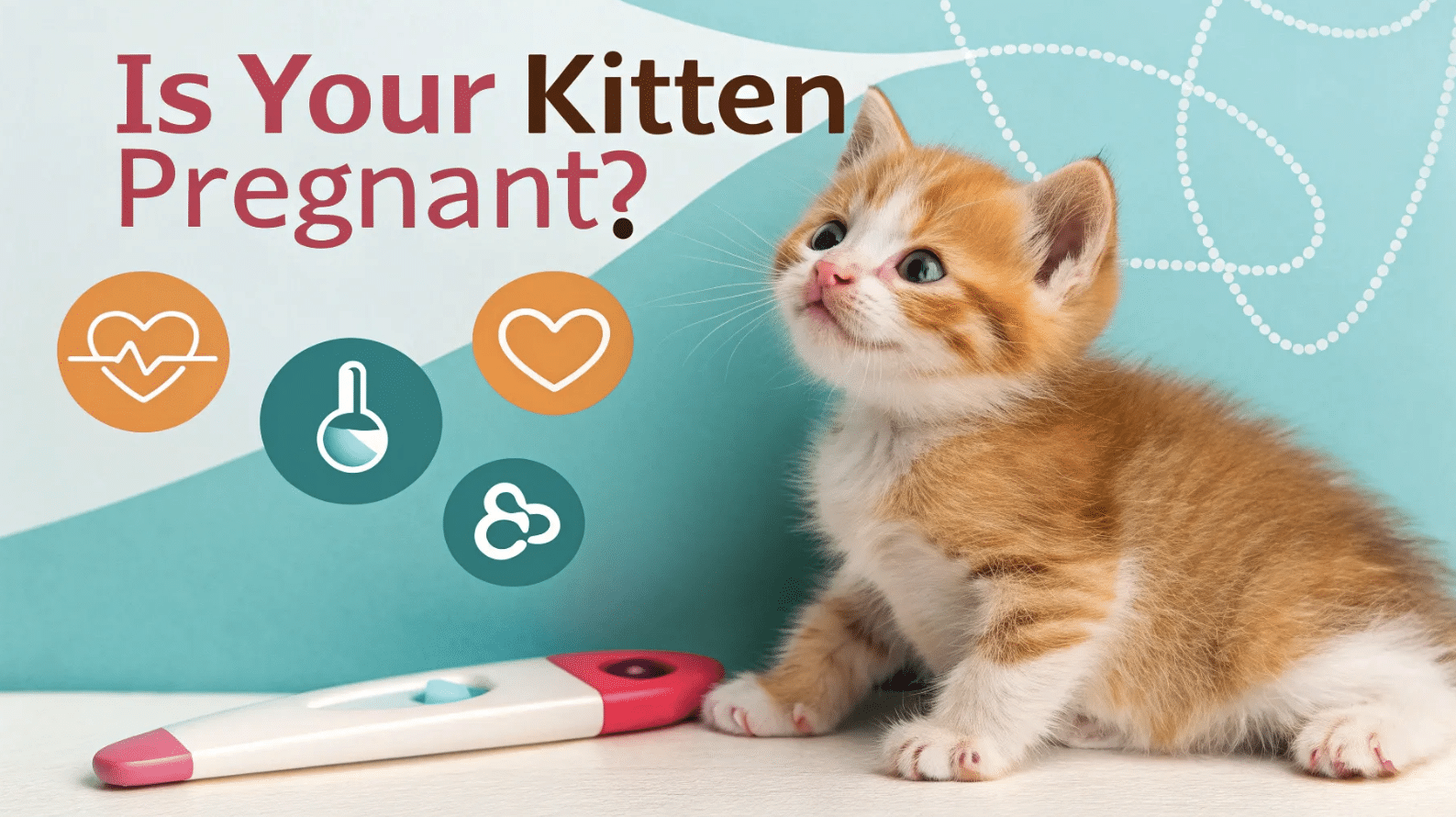
Recognizing the early signs of pregnancy in your kitten is crucial for providing the right care. Pregnant kittens show physical and behavioral changes. For instance, they might gain weight or exhibit nesting behaviors. Pregnant kittens need extra attention and a high-calorie diet to support their growing needs. Understanding these changes ensures your kitten receives the best care possible.
Recognizing Physical Signs of Pregnancy
When I first noticed my neighbor’s kitten, Barrack, acting a bit differently, I wondered if she might be pregnant. Recognizing the physical signs of pregnancy in kittens can be a bit tricky, but it’s essential for providing the right care. Let’s get into some of the tell-tale signs that your kitten might be expecting.
Changes in Appetite
One of the first things we observed with Barrack was a change in her eating habits. Pregnant queens often experience an increase in appetite. They need more calories to support the growing kittens inside them. You might notice your kitten eating more than usual or even becoming picky about her food. It’s important to provide a high-calorie diet during this time to ensure both the mother and kittens remain healthy.
Physical Changes
Physical changes are another significant indicator of pregnancy. With Barrack, we noticed her nipples became swollen and darker, a phenomenon known as “pinking-up.” This usually happens around three weeks into the pregnancy. Additionally, her belly started to grow, becoming noticeably rounder as the weeks went by. These changes are part of the natural progression of cat pregnancy and are essential markers to watch for.
Weight Gain
Weight gain is perhaps one of the most obvious signs. As the kittens develop, the mother will naturally gain weight. In Barrack’s case, my neighbor and I could see her gaining weight steadily over a few weeks. It’s essential to monitor this weight gain to ensure it’s healthy and not excessive. A gradual increase is normal, but sudden or excessive weight gain might require a visit to the vet.
Understanding these physical signs can help you determine if your kitten is pregnant. If you suspect pregnancy, consulting with a veterinarian is always a good idea. They can provide a more accurate diagnosis and offer guidance on how to care for your pregnant queen. Remember, early detection and proper care are key to ensuring a healthy pregnancy for your Des Moines companion animals.
Observing Behavioral Changes
When we first noticed Barrack’s behavior changing, we couldn’t help but wonder if she was pregnant. Behavioral changes can be a Big clue in determining if your kitten is expecting.
Nesting Behavior
One of the first things my neighbor observed was Barrack’s nesting behavior. She started to search for quiet, secluded spots around the house. This behavior is common in pregnant cats as they prepare a safe space for their kittens. You might notice your kitten gathering soft materials like blankets or towels to create a cozy nest. It’s fascinating to watch this instinctive behavior unfold. Providing a comfortable and secure area for your kitten can help ease her stress during this time.
Increased Affection
Another noticeable change was Barrack’s increased affection. She became more cuddly and sought our attention more often. According to Woodland Animal Hospital, pregnant cats may become more affectionate because they feel vulnerable and need extra love and care. This shift in behavior can be a Big indicator of pregnancy. If your kitten suddenly becomes more attached, it might be time to consider the possibility of her being pregnant.
Understanding these behavioral changes can help you determine if your kitten is pregnant. If you notice these signs, it’s a good idea to consult with Des Moines vets for confirmation and guidance. They can provide valuable insights and support throughout your kitten’s pregnancy journey. Remember, every kitten is unique, so observing and understanding her specific needs is crucial.
Diagnostic Methods
Understanding the diagnostic methods available can make a world of difference in preparing for the Big Day when the kittens arrive.
Veterinary Examination
Visiting a veterinarian is one of the most reliable ways to confirm pregnancy in your kitten. Vets have several tools at their disposal:
-
Palpation: Around two and a half weeks into the pregnancy, a vet can gently palpate your kitten’s abdomen to feel for developing fetuses. This method requires a skilled hand to avoid any harm to the kittens or the mother.
-
Ultrasound: This is a more advanced method that can detect pregnancy as early as 14 days. An ultrasound not only confirms the presence of kittens but can also provide an estimate of how many there are.
-
X-rays: While X-rays can give a clearer picture of the number of kittens, they are only safe after 42 days of gestation. This method is often used later in the pregnancy to get a better idea of the litter size.
Home Observation
While veterinary examinations are crucial, you can also observe certain signs at home to gauge if your kitten might be pregnant. Here are some things to watch for:
-
Behavioral Changes: As mentioned earlier, increased affection or nesting behavior can be indicators. Keep an eye on how your kitten interacts with her environment and you.
-
Physical Signs: Look for changes in appetite and weight gain. A pregnant kitten will often eat more and gain weight steadily. These signs, combined with behavioral changes, can give you a good indication of pregnancy.
-
Monitoring: Regularly check your kitten’s abdomen for any noticeable changes. As the pregnancy progresses, her belly will become rounder and more pronounced.
Combining home observations with veterinary care ensures your kitten gets the best support during her pregnancy. Each kitten is unique, so understanding her specific needs is crucial for a healthy and happy pregnancy.
Step by Step Detailed Instructions
If you’re in a similar situation, these step-by-step instructions will guide you through monitoring your kitten and preparing for the arrival of her kittens.
Monitoring Your Kitten
Keeping a close eye on your kitten’s health and behavior is crucial. Here’s how we approached it:
-
Daily Observations: We made it a habit to observe Barrack every day. We looked for changes in her appetite, weight, and behavior. A pregnant kitten often shows increased appetite and gradual weight gain. We noted these changes in a journal to track her progress.
-
Physical Checks: We gently checked Barrack’s abdomen for any noticeable changes. Her belly became rounder as the pregnancy progressed. This physical change was a clear sign that she was expecting.
-
Behavioral Monitoring: We paid attention to Barrack’s behavior. She started showing nesting behavior, searching for quiet spots around the house. Increased affection was another sign. She sought more attention and cuddles, which was a delightful change.
-
Regular Vet Visits: We scheduled regular check-ups with the vet. These visits ensured Barrack’s health and confirmed her pregnancy. The vet used ultrasound to monitor the kittens’ development, providing peace of mind.
Preparing for Kittens
Preparing for the arrival of kittens requires some planning. Here’s what we did:
-
Creating a Nesting Area: My neighbor set up a cozy, quiet space for Barrack. We used a box lined with soft blankets, ensuring it was in a secluded area. This space became her safe haven as she prepared for motherhood.
-
Gathering Supplies: My neighbor stocked up on essential supplies. This included kitten food, a litter box, and cleaning materials. High-calorie kitten food is vital for a pregnant cat’s diet.
-
Understanding Potential Challenges: Health concerns, such as gestational diabetes, can arise. Behavioral issues, such as increased territoriality, might occur. Knowing these helped us stay prepared.
-
Seeking Veterinary Support: We maintained open communication with the vet. Their guidance was invaluable, especially when we had questions or concerns. They provided reassurance and expert advice.
Monitoring your kitten and preparing for her kittens can be a rewarding experience. With the right approach, you can ensure a smooth journey for both you and your furry friend. Remember, each kitten is unique, so adapt these steps to fit your situation.
What You Need
Essential Supplies
Having the right supplies on hand makes a world of difference. Here’s what we found essential:
-
High-Calorie Diet: Pregnant cats need a high-calorie diet to support their growing kittens. We switched Barrack to a special high-calorie food recommended by the vet. This diet provided the necessary nutrients for her and her kittens.
-
Clean Towels and Gloves: During delivery, having clean towels and gloves ready is crucial. These items help with the birth process and ensure a clean environment for the newborns.
-
Nutritious Food and Water: Access to clean water and nutritious food is vital throughout pregnancy and while caring for kittens. We made sure Barrack always had fresh water and high-quality food available.
-
Nesting Box: Creating a comfortable nesting area is important. My neighbor used a box lined with soft blankets, placed in a quiet corner of the house. This space became Barrack’s safe haven as she prepared for motherhood.
Here’s a quick table summarizing the essential supplies:
|
Item |
Purpose |
|---|---|
|
High-Calorie Diet |
Supports growth of kittens |
|
Clean Towels & Gloves |
Assists with delivery |
|
Nutritious Food & Water |
Ensures health during pregnancy and nursing |
|
Nesting Box |
Provides a safe space for delivery |
Veterinary Support
Veterinary support plays a crucial role in ensuring a healthy pregnancy.
-
Regular Check-Ups: My neighbor scheduled regular visits to the vet. These check-ups ensured Barrack’s health and monitored the development of her kittens. The vet used ultrasounds to track her progress, providing peace of mind.
-
Vaccinations and Worm Checks: Before pregnancy, it’s important to vaccinate your cat and check for worms. This preventive care helps maintain the health of both the mother and her kittens.
-
Expert Guidance: The vet offered invaluable advice throughout the pregnancy. They guided us on dietary changes and potential health concerns. Having a trusted vet by your side makes the journey smoother.
-
Emergency Contact: We kept the vet’s contact information handy for any emergencies. Knowing we could reach out for help at any time was reassuring.
Preparing for kittens requires careful planning and the right resources. With these essential supplies and veterinary support, you can ensure a smooth and healthy pregnancy for your cat. Remember, every cat is unique, so adapt these steps to fit your situation.
Common Mistakes to Avoid
Misinterpreting Signs
Misreading the signs of pregnancy in cats can lead to unnecessary stress and confusion. Here are some key points to keep in mind:
-
Physical Changes: Not all physical changes indicate pregnancy. For instance, weight gain could result from overfeeding or lack of exercise. Similarly, swollen nipples might not always mean your cat is pregnant. It’s essential to consider the overall context and other accompanying signs.
-
Behavioral Shifts: Increased affection or nesting behavior can suggest pregnancy, but it may also stem from other factors, such as stress or environmental changes. Cats sometimes exhibit these behaviors due to changes in their surroundings or routine.
-
Timing: Pregnancy signs may not appear immediately. It often takes a few weeks for noticeable changes to occur. Jumping to conclusions too early can lead to misinterpretation. Patience is key when observing your cat’s behavior and physical state.
-
Professional Confirmation: Always seek professional advice if you suspect your cat might be pregnant. A veterinarian can provide a definitive answer through examinations and tests. This step ensures you receive accurate information and guidance on caring for your pregnant cat.
Here’s a quick table summarizing common signs and potential misinterpretations:
|
Sign |
Possible Misinterpretation |
Correct Interpretation |
|---|---|---|
|
Weight Gain |
Overfeeding or lack of exercise |
Developing kittens |
|
Swollen Nipples |
Hormonal changes |
Pregnancy (if accompanied by other signs) |
|
Increased Affection |
Stress or environmental changes |
Pregnancy-related behavior |
|
Nesting Behavior |
Seeking comfort |
Preparing for kittens |
Understanding these nuances helps prevent misinterpretation and ensures your cat receives the care she needs. If you’re ever in doubt, don’t hesitate to contact your vet for guidance. They can provide valuable insights and support throughout your kitten’s pregnancy journey.
Every kitten is unique, and each pregnancy journey is different. By staying informed and prepared, you can ensure a smooth experience for both you and your furry friend.
Caring for a pregnant kitten involves recognizing physical and behavioral changes. We found that monitoring these signs early on is crucial. For further reading, consider a book on feline care. It can offer valuable insights. Your kitten’s health is a priority. With the right care, you ensure a smooth experience.

In her previous life, Lisa traveled extensively, both for work and leisure. After the pandemic struck, Lisa locked up her luggage and adopted a cat ever since.
Lisa is now an avid cat lover, she devotes most of her free time serving as butler to her adorable feline at home. When she is not with her cat, she can be seen using her phone sourcing for the latest cat supplies online.


